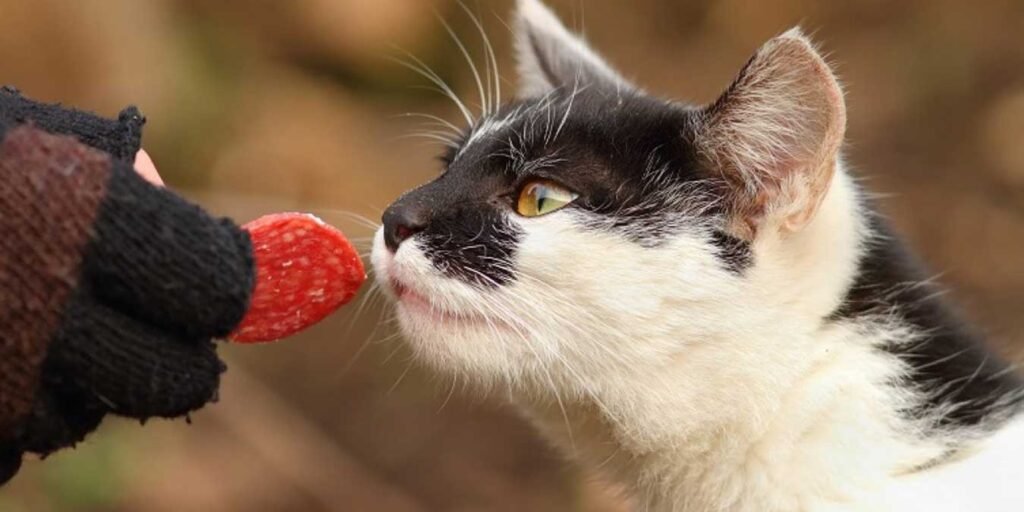Salami is a cured meat known for its strong flavor and distinct aroma. While it may be tempting to share a bite of your salami sandwich with your kitty, it’s important to consider their dietary needs and overall health.
Cats are obligate carnivores, meaning their bodies require animal-derived protein to thrive. While they can enjoy certain meats in moderation, not all types are safe for them to consume. Salami, in particular, poses potential risks to cats due to its high fat, salt, and seasoning content. These factors can lead to digestive upset, pancreatitis, and even sodium poisoning in cats.
It’s always best to consult with your veterinarian before introducing any new foods into your cat’s diet. They can provide guidance on what is safe and appropriate for your feline friend. Remember, a balanced and species-appropriate diet is essential for maintaining your cat’s health and overall well-being. So, when it comes to salami and cats, it’s best to play it safe and avoid it altogether.
Salami, being a processed meat, contains high amounts of fat, salt, and various seasonings, all of which can be detrimental to a cat’s health. A diet rich in fat can lead to obesity and increase the risk of associated health issues, such as diabetes and heart disease. Additionally, the excessive sodium in salami can lead to sodium poisoning, with symptoms including vomiting, diarrhea, and lethargy. It’s also important to consider that some cats may develop allergies to certain ingredients in salami. For more information, you can read about these potential reactions in our section on Cats Allergy Symptoms. Therefore, while it might be tempting to offer your cat a slice of salami, the potential health risks should not be overlooked.
Ultimately, the question of whether cats can have salami is not simply a yes or no answer. Instead, it requires a nuanced understanding of what salami is, its composition, and how it aligns with a cat’s nutritional requirements. For the sake of your cat’s health, it’s crucial to err on the side of caution and think twice before sharing your salami sandwich.
Is Salami Good for Cats?
Salami is often marketed as a savory snack for humans, but when assessing its nutritional value for cats, it falls short. Although it contains protein, which is essential for cats, the potential negatives significantly overshadow this benefit. Salami is highly processed and often includes fillers, preservatives, and additives that are not suitable for a cat’s diet. The presence of these ingredients raises questions about its overall health benefits.
Additionally, the fat content in salami can be problematic. While some fat is necessary for a cat’s diet, too much can lead to obesity and pancreatitis, a painful and serious condition. Cats require a balanced intake of nutrients, and a high-fat treat like salami can disrupt that balance. Furthermore, the high sodium levels can lead to serious issues, especially in cats that may already have underlying health problems. Thus, while salami might seem like an appealing treat, it doesn’t offer any substantial benefits to a cat’s diet.
In essence, salami is not good for cats. Its composition and processing methods render it unsuitable as a treat. Instead, there are many other protein-rich, cat-friendly options available that can provide both taste and essential nutrients without the associated risks of processed meats.

Is it Safe to Feed Cats Salami?
Feeding cats salami is not considered safe. The risks associated with its high salt and fat content, along with the potential presence of harmful additives, make it an unwise choice for pet owners. The sodium levels in salami can lead to dehydration and adverse reactions, particularly in cats with pre-existing health conditions. If a cat consumes too much salt, it could experience severe symptoms, including tremors, seizures, and even coma in extreme cases.
Moreover, the preservatives used in salami, such as nitrates and nitrites, can be harmful. These chemicals are often linked to various health issues, including cancer in humans, and their effects on cats are not well-studied. Given their delicate digestive systems, the introduction of such substances can lead to long-term health complications.
In light of these factors, it’s clear that salami is not a safe food choice for cats. If you want to treat your feline companion, there are plenty of healthier options available that are specially formulated to meet their dietary needs. Always prioritize safety and opt for treats that contribute positively to your cat’s health.
Can Cats Die From Eating Salami?
While it is unlikely that a single small piece of salami would be fatal to a cat, the consumption of larger amounts or repeated exposure to this type of food can lead to severe health risks, potentially resulting in death. The high salt content poses a significant risk, as excessive sodium intake can lead to sodium ion poisoning. Symptoms may escalate quickly from vomiting and diarrhea to more severe neurological issues, which could be life-threatening if not addressed promptly.
Additionally, the possibility of pancreatitis from high-fat foods like salami is another serious risk. This condition, characterized by inflammation of the pancreas, can lead to severe pain, vomiting, and, in extreme cases, death if left untreated. The cat’s overall health, age, and existing medical conditions will also play a crucial role in determining how they react to ingesting inappropriate foods.
It’s worth noting that any new food introduced into a cat’s diet should be approached with caution. If a cat exhibits any distressing symptoms after eating salami, immediate veterinary attention is essential. Though it may not be a common cause of death, the potential complications arising from salami consumption cannot be ignored.
How to Prepare Salami for Cats?
If you are still considering giving your cat a taste of salami, it’s crucial to know that proper preparation is key to minimizing risks. However, the best advice remains to avoid salami altogether due to its harmful components. If you’re determined to offer a small sample, ensure that it is as plain as possible, free from spices, preservatives, and additives. This means selecting a brand that uses minimal ingredients and is devoid of garlic or onion, both of which are toxic to cats. For more information on why these ingredients are dangerous, you can read about Garlic and Cats.
When preparing salami for your cat, consider cutting it into tiny, manageable pieces. This not only reduces the risk of choking but also minimizes the quantity being given at one time. Remember, even tiny amounts can still pose risks, so moderation is crucial. After cutting the salami, observe your cat closely for any signs of distress or digestive issues.
Ultimately, the preparation of salami for cats should be approached with extreme caution. If you choose to go forward with this, remember that it should be an exceptionally rare treat. The long-term health of your cat is far more important than a fleeting indulgence in a human snack.
Avoid Harmful Additives in Salami
One of the significant concerns with salami is the presence of harmful additives that can adversely affect your cat’s health. Many commercially available salami varieties contain preservatives like nitrates and nitrites, which are often used to enhance flavor and extend shelf life. Unfortunately, these additives can have toxic effects on cats, leading to serious health issues over time.
To keep your feline friend safe, it’s best to avoid salami and focus on providing treats specifically formulated for cats. These options are generally free of harmful additives and provide the necessary nutrients for your cat’s health. By prioritizing safer and more appropriate food choices, you can help ensure your cat remains healthy and happy.

Signs of Digestive Issues After Eating Salami
If a cat ingests salami, it may exhibit several signs indicating digestive distress. Common symptoms include vomiting, diarrhea, and lethargy, which can manifest quickly after consumption, sometimes within hours. Additionally, it’s important to be aware that some cats may also show signs of allergies. For more information on this, you can read about Cats Allergy Symptoms. If your cat shows any of these symptoms after eating salami, it’s crucial to monitor them closely and consult your veterinarian if symptoms persist.
Other potential signs of digestive issues include abdominal pain and changes in appetite. A cat may become more reclusive or show signs of discomfort, such as pacing or vocalizing more than usual. In some cases, you might notice changes in their litter box habits, indicating digestive upset.
Immediate action is necessary if you observe any severe symptoms, such as blood in vomit or stool or signs of dehydration. These conditions can escalate quickly and may require urgent medical intervention. Always err on the side of caution and consult a veterinarian if you suspect your cat is having a negative reaction to any food, including salami.
How Much Salami is Too Much for Cats?
Determining how much salami is too much for cats is challenging due to the various risks associated with its consumption. Even a single slice can be too much, depending on the size of the cat and its individual health status. Generally speaking, any amount of salami poses a risk due to its high salt and fat content, and thus it is best to avoid it altogether.
If a cat has consumed salami, it’s essential to observe them for any signs of distress. As mentioned earlier, symptoms can range from mild digestive upset to more severe health issues. If you find that your cat has ingested more than just a tiny piece, it is wise to consult a veterinarian for guidance. They can provide recommendations based on your cat’s weight, age, and overall health.
In conclusion, the question of how much salami is too much is simple: any amount is not ideal. Prioritizing a diet that is specifically designed for feline health will always be the best approach to keeping your cat safe and healthy.
Conclusion: Can Cats Have Salami
In summary, while the thought of sharing a favorite snack like salami with your cat may be tempting, the risks associated with its consumption far outweigh any potential enjoyment. Salami is laden with harmful additives, high levels of fat and salt, and potentially toxic ingredients that can lead to serious health issues. As responsible pet owners, it is our duty to prioritize the health and well-being of our feline companions. For more guidance on ensuring your cat’s diet is safe and nutritious, check out our section on How to Choose the Right Cat Food for Your Cats.
Cats thrive on a balanced diet tailored to their unique nutritional needs. Instead of salami, consider offering treats specifically formulated for cats or small amounts of cooked, unseasoned meats like chicken or turkey, which can be far more beneficial. Always consult your veterinarian if you have any doubts or questions regarding your pet’s diet.
Ultimately, the safest decision is to avoid giving salami to your cat. By doing so, you can help ensure that your beloved furry friend stays healthy, happy, and free from the risks associated with inappropriate foods. And also find more useful information about pet cares on Cooper Pet Cares.